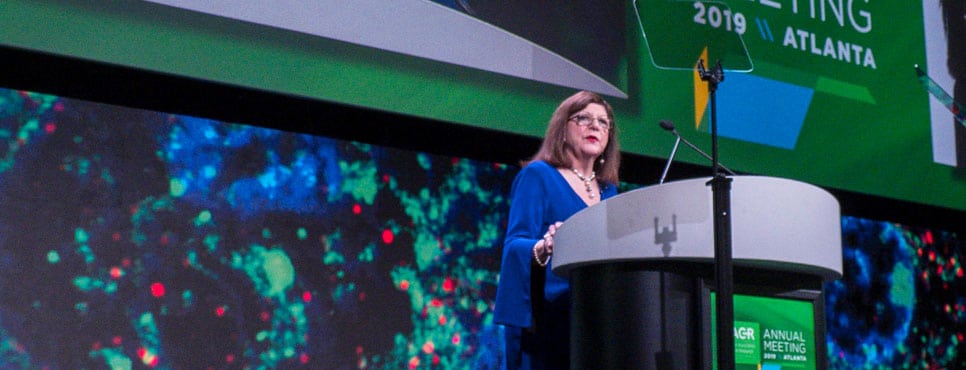Chief Executive Officer: Margaret Foti, PhD, MD (hc)
President: Patricia M. LoRusso, DO, PhD, (hc), FAACR (2024-2025)
President-Elect: Lillian L. Siu, MD, FAACR (2024-2025)
Past President: Philip D. Greenberg, MD, FAACR (2024-2025)
Treasurer: William N. Hait, MD, PhD, FAACR (2022-2025)
Mission
The mission of the American Association for Cancer Research (AACR) is to prevent and cure cancer through research, education, communication, collaboration, science policy and advocacy, and funding for cancer research. Through its programs and services, the AACR fosters research in cancer and related biomedical science; accelerates the dissemination of new research findings among scientists and others dedicated to the conquest of cancer; promotes science education and training; and advances the understanding of cancer etiology, prevention, diagnosis, and treatment throughout the world.
How Did the AACR Begin?
The AACR was founded in Washington, D.C., May 7, 1907, by a group of 11 physicians and scientists interested in research “to further the investigation and spread the knowledge of cancer.”
Governance
AACR Financial Information
AACR Fast Facts
- The AACR has more than 58,000 members residing in 142 countries and territories.
- Members include laboratory, translational, and clinical researchers; population scientists; other health care professionals; and patient advocates.
- Membership includes 342 Fellows of the AACR Academy; 57 are Nobel laureates.
- The AACR is headquartered in Philadelphia, with offices in Boston; Washington, D.C.; and Toronto, Canada.
- The organization publishes 10 peer-reviewed journals: Blood Cancer Discovery, Cancer Discovery; Cancer Epidemiology, Biomarkers & Prevention; Cancer Immunology Research; Cancer Prevention Research; Cancer Research; Cancer Research Communications; Clinical Cancer Research; Molecular Cancer Research; and Molecular Cancer Therapeutics.
- Other AACR publications include Cancer Today, a magazine for cancer patients and caregivers; the annual AACR Cancer Progress Report; the AACR Cancer Disparities Progress Report; the AACR Annual Impact Report; Leading Discoveries, the AACR’s awareness and donor magazine; and the blog, Cancer Research Catalyst.
- The AACR funds meritorious research directly, as well as in cooperation with numerous cancer-focused organizations. As the Scientific Partner of Stand Up To Cancer, the AACR provides expert peer-review, grants administration, and scientific oversight of team science and individual grants in cancer research that have the potential for near-term patient benefit.
- The AACR Office of Science Policy and Government Affairs actively communicates with legislators and policymakers about the value of cancer research and related biomedical sciences to reduce cancer-related morbidity and mortality. It also advocates for critical federal cancer research funding.
- The AACR hosts more than 30 scientific conferences and educational workshops annually. The largest is the AACR Annual Meeting.
- AACR workshops, fellowships, and career development grants support the education and training of young investigators, who are the future of cancer research.
- The AACR Survivor and Patient Advocacy Program provides support for cancer survivors and their families.
- The AACR Foundation accelerates progress in the conquest of cancer by providing financial support for scientific research, education, and communication. The Foundation funds programs deemed by the AACR to be of the highest priority and impact.
